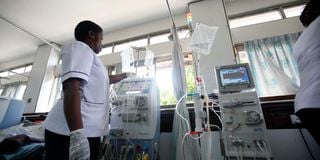NHIF boss tells cancer, kidney and heart patients to avoid hospitals not offering full cover

A nurse works on dialysis machines at the Kenyatta National Hospital ward in 2015.
What you need to know:
- NHIF data shows that Kenya has 38 comprehensive cancer hospitals, including faith-based, private, and government facilities, in 18 counties.
- A full cycle of chemotherapy for breast cancer costs up to Sh150,000 in a private hospital and Sh50,000 in a non-comprehensive public hospital.
Patients with chronic illnesses such as cancer, kidney, and heart diseases have been urged to seek treatment and care at health facilities with comprehensive contracts with the National Hospital Insurance Fund (NHIF) to avoid out-of-pocket payments for services.
Hospitals under comprehensive contracts offer all-inclusive services to NHIF members without requiring out-of-pocket payments for walk-in and walk-out treatments.
Mr Elijah Wachira, the chief executive officer of the NHIF, said the health scheme has entered into a contract with comprehensive hospitals to ensure that critically ill patients receive treatment without any payment, unlike at non-comprehensive facilities.
"In non-comprehensive facilities, when an NHIF member goes for treatment, they are treated and have to pay some cash before they leave the hospital. Many private hospitals are non-comprehensive, while all government hospitals and missions are comprehensive," said Mr Wachira.
The call follows an outcry from critically ill patients, including renal transplant and cancer patients, who claim that the NHIF approved very low reimbursements for pre-authorised claims. For instance, a renal transplant patient got approval of Sh50,000 for a procedure which is supposed to cost Sh1.2 million.
In another case, a heart patient got approval for Sh400,000 NHIF funds against the Sh1.5 million required.
At the same time, cancer patients undergoing chemotherapy at private hospitals claimed they were being delayed or denied treatment amid referrals to government-owned facilities.
According to Mr Wachira, patients are sometimes transferred from private to government or mission hospitals because the private facilities are becoming too expensive.
"Chronic diseases like cancer are so expensive to treat. So when resources are exhausted, they are transferred to a lower-class facility so that they can continue their treatment without incurring additional costs. From an insurance perspective, patients never die of disease, they die of lack of money," he said.
Despite the existence of comprehensive facilities, the uneven distribution of oncologists and facilities means that many patients seek treatment in private hospitals, which are also expensive.
38 cancer hospitals
NHIF data shows that Kenya has 38 comprehensive cancer hospitals, including faith-based, private, and government facilities, in 18 counties.
However, there are only 58 oncologists, 60 oncology nurses, and 12 oncology pharmacists to meet the demand for cancer care. The World Health Organisation (WHO) recommends a ratio of 1:1000 clinical oncologists to cancer patients.
According to the National Cancer Institute of Kenya (NCIK), there are currently only 58 oncologists, 60 oncology nurses, and 12 oncology pharmacists to meet the demand for cancer care.
The WHO recommends that the ratio of clinical oncologists to cancer patients should be 1:1000.
The NCIK also found that there are only three national comprehensive cancer centres in the country, including Kenyatta National Hospital, Moi Teaching and Referral Hospital, and Kenyatta University Teaching Research and Referral Hospital.
The cost of cancer treatment varies depending on the diagnosis and the hospital.
A full cycle of chemotherapy for breast cancer costs up to Sh150,000 in a private hospital and Sh50,000 in a non-comprehensive public hospital.
Cancer patients seeking cervical chemotherapy will pay up to Sh120,000 in a private hospital compared to Sh40,000 in a public facility.
Cancer is the third leading cause of death in Kenya and is expected to increase in the coming years due to population growth, increased life expectancy, urbanisation, and an increase in risk factors for cancer.





